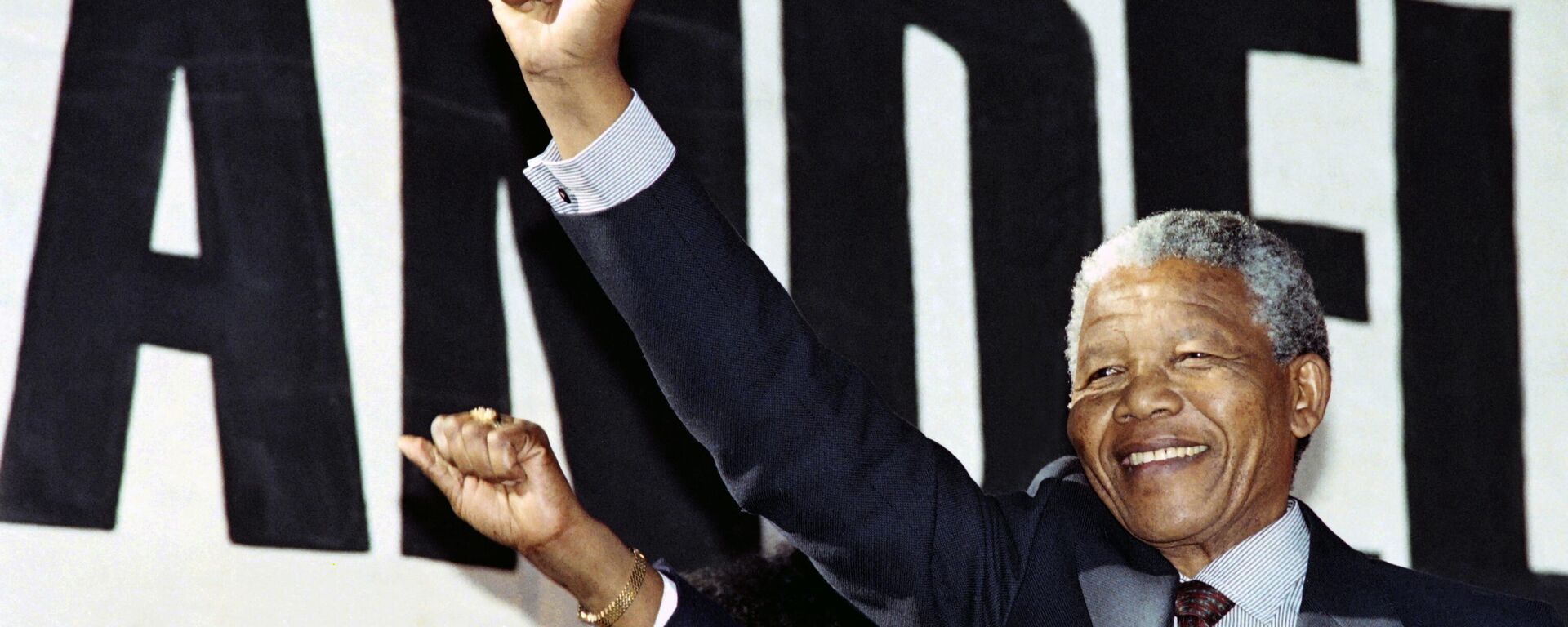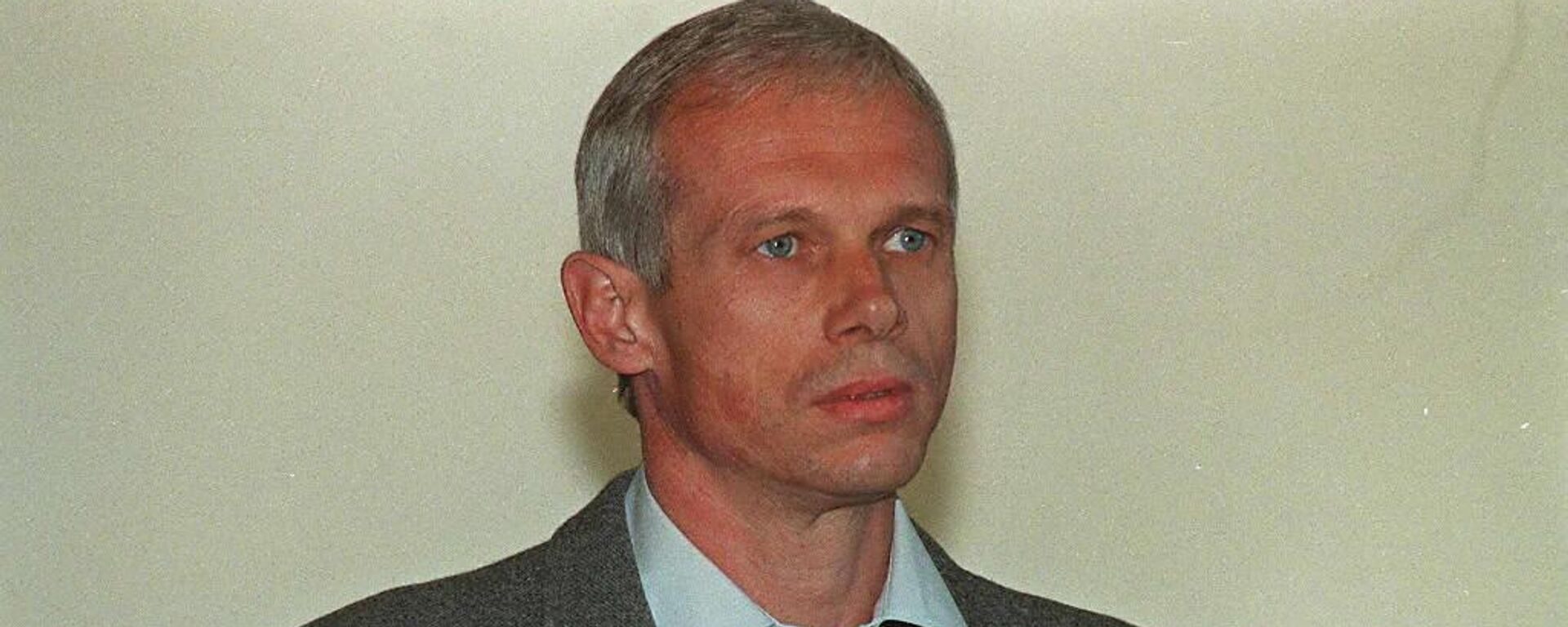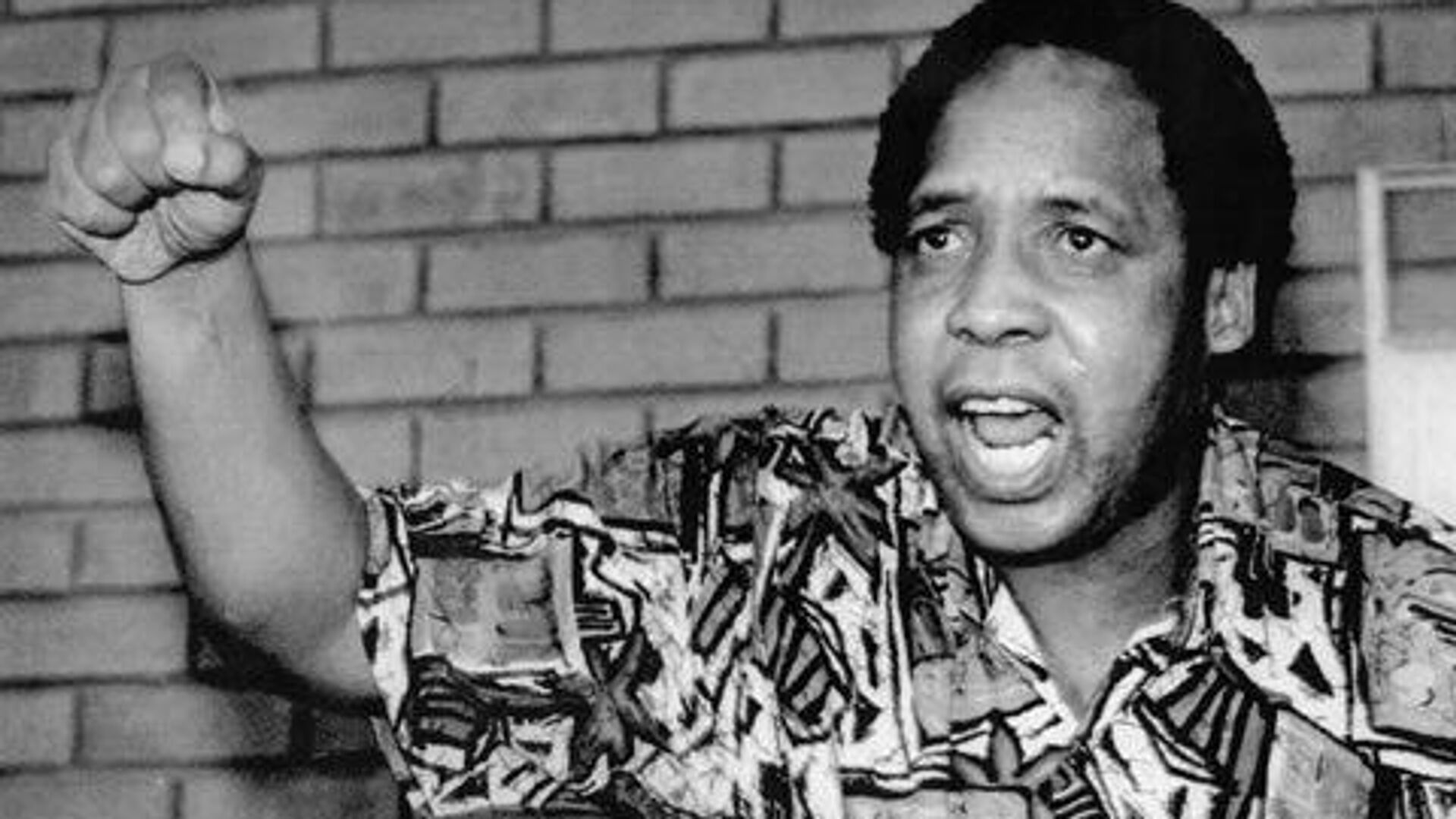https://sputnikglobe.com/20230411/south-africa-remembers-comrade-hani-marking-30-years-since-his-murder-1109313169.html
South Africa Remembers Comrade Hani, Marking 30 Years Since His Murder
South Africa Remembers Comrade Hani, Marking 30 Years Since His Murder
Sputnik International
Chris Hani is viewed as one of the key figures in South Africa's fight against the apartheid. He is sometimes described to be the most popular figure of the liberation movement after Nelson Mandela at the time Hani was murdered.
2023-04-11T08:11+0000
2023-04-11T08:11+0000
2023-04-11T13:11+0000
africa
southern africa
south africa
apartheid
nelson mandela
fight
anniversary
commemoration
freedom
fighter
https://cdn1.img.sputnikglobe.com/img/07e7/04/0a/1109312852_0:27:480:297_1920x0_80_0_0_4a7a07697cadf6a175f91a893a4ad43c.jpg
Chris Hani is viewed as one of the key figures in South Africa's fight against the apartheid. He was the 11th General Secretary of South African Communist Party (SACP) and chief-of-staff of Umkhonto we Sizwe, the African National Congress' (ANC) militant wing. He is sometimes described to be the most popular figure of the liberation movement after Nelson Mandela at the time Hani was murdered.He was assassinated by Janusz Walusz, a Polish immigrant, follower of Afrikaner Weerstandsbeweging (Afrikaner Resistance Movement), paramilitary organization of South African Afrikaner nationalists 30 years ago, on April 10, 1993.Early yearsHani (born Martin Thembisile Hani) was born on June 28, 1942, to a large family (he was the 5th of 6 children) in the Xhosa village in Cofimvaba. He was 12 years old when he decided to join the ANC after his father explained to him what apartheid was. As Hani was too young at the time, he joined the ANC Youth League at 15 (despite the fact that though political activities were prohibited at black schools under apartheid). Even then, Hani inspired other pupils to join the African National Congress.From 1959 to 1961, the future SACP leader studied English, Latin, as well as modern and classical literature at University of Fort Hare in Alice, Eastern Cape. Hani was not engaged in any sports activities as he once said "I would rather fight apartheid than play sports".Political ActivitiesAs a student, he actively participated in protests against the Bantu Education Act (a segregation law dating back to 1953, also known as the Black Education Act, which enforced racially-separated education institutions). After graduation, he joined Umkhonto we Sizwe (MK). As MK's goal was fighting South Africa’s government, later in 1961 the apartheid regime in power then classified it as a terrorist organization and levelled a ban against it.In 1961, he joined the South African Communist Party. Later, in 1963 Hani was arrested under the Suppression of Communism Act, after what he went into exile in Lesotho. Due to Hani's engagement in Umkhonto we Sizwe, he was forced to go into hiding by the South African government. At that time, he decided to change his first name to Chris.Military Fight for FreedomHani received military training in the USSR and served in several campaigns during the Zimbabwean War of Independence, also known as Rhodesian Bush War, where military operations were conducted by Umkhonto we Sizwe and the Zimbabwe People's Revolutionary Army in the late 1960s. His role as a fighter from the early days of the MK exile (after the arrest of Nelson Mandela and other internal MK leaders) gave him a high degree of loyalty, which he enjoyed in some circles later as deputy commander of the MK.After moving to Lesotho, Hani organized MK guerrilla operations in South Africa. By 1982, he had become prominent enough to be targeted for assassination, subsequently, he moved to the ANC headquarters in Lusaka, Zambia. Many female MK operatives were thankful to Chris Hani for protecting women's rights and taking care of their well-being in military camps.After spending some time as a hidden operations' leader in the mid-1970s, he returned to South Africa permanently after the ban on ANC was lifted in 1990 and took over as head of SACP on December 8, 1991. He supported the suspension of the ANC's armed fight and advocated for negotiations.Assassination and Perpetrators' FateOn April 10, 1993, Hani was killed on his way back home in a suburb east of Johannesburg just when, negotiations dedicated to the end of apartheid in South Africa were being held. The assassination took place a year before the nation's first multiracial election.Janusz Walus, who immigrated to South Africa in 1981 from Poland, was assisted in carrying out the crime by South African politician and parliament member from the Conservative Party, Clive Derby-Lewis, who supplied him with a gun to assassinate Hani.Both were convicted of murder and sentenced to death in October 1993. The sentences were commuted to life imprisonment after the abolition of the death penalty on the basis of a ruling of the Constitutional Court in 1995.Walus was stabbed in prison just a few days following the country’s constitutional court order for his release on parole. Derby-Lewis died of lung cancer in 2016, one year after he had been released on medical parole. He spent 22 years behind bars.Anniversary Commemoration on Social MediaToday, on the day when South Africa commemorates the freedom fighter, South African organizations and parties also honor the memory of Chris Hani. The ruling African Nation Congress has commented on the solemn date. The ANC harked back to the country's first president Nelson Mandela, who described Hani's assassination as "a heinous crime against not only his person and his family, but also against the people of our country as a whole". According to the ANC, even 30 years after the assassination, the entire truth has not come out and not every person responsible has been held accountable.Moreover, the leader of the South African Communist Party, Solly Mapaila, has stated that the party would use the 30th anniversary to keep searching for the truth. The SACP wants to pursue an inquiry into Hani's murder in order to find the truth. Mapaila has outlined the party had already collected 20,000 signatures in support of the call, adding that he hoped for 30,000, so that it would symbolize the 30th anniversary commemoration.Another South African party, the Economic Freedom Fighters (EFF), has also honored the memory of the freedom fighter.
https://sputnikglobe.com/20221205/nelson-mandelas-struggle-and-legacy-for-south-africa-1105041360.html
https://sputnikglobe.com/20221130/murderer-of-south-african-anti-apartheid-era-figure-stabbed-in-jail-days-before-parole-release-1104849764.html
africa
southern africa
south africa
Sputnik International
feedback@sputniknews.com
+74956456601
MIA „Rossiya Segodnya“
2023
News
en_EN
Sputnik International
feedback@sputniknews.com
+74956456601
MIA „Rossiya Segodnya“
Sputnik International
feedback@sputniknews.com
+74956456601
MIA „Rossiya Segodnya“
chris hani, south africa, anti-apartheid leader, south african communist party, umkhonto we sizwe, african national congress, martin thembisile hani, janusz walus, conservative party, clive derby-lewis, constitutional court, guerrilla operations, nelson mandela
chris hani, south africa, anti-apartheid leader, south african communist party, umkhonto we sizwe, african national congress, martin thembisile hani, janusz walus, conservative party, clive derby-lewis, constitutional court, guerrilla operations, nelson mandela
South Africa Remembers Comrade Hani, Marking 30 Years Since His Murder
08:11 GMT 11.04.2023 (Updated: 13:11 GMT 11.04.2023) Yesterday marked the 30th anniversary of the death of Chris Hani – one of the most prominent of South Africa's anti-apartheid leaders, who was assassinated on April 10, 1993. Sputnik recalls the life and struggle of the freedom fighter.
Chris Hani is viewed as one of the key figures in
South Africa's fight against the apartheid. He was the 11th General Secretary of South African Communist Party (SACP) and chief-of-staff of Umkhonto we Sizwe, the African National Congress' (ANC) militant wing. He is sometimes described to be the most popular figure of the liberation movement after Nelson Mandela at the time Hani was murdered.
He was assassinated by Janusz Walusz, a Polish immigrant, follower of Afrikaner Weerstandsbeweging (Afrikaner Resistance Movement), paramilitary organization of South African Afrikaner nationalists 30 years ago, on April 10, 1993.
Hani (born Martin Thembisile Hani) was born on June 28, 1942, to a large family (he was the 5th of 6 children) in the Xhosa village in Cofimvaba. He was 12 years old when he decided to join the ANC after his father explained to him what apartheid was. As Hani was too young at the time, he joined the ANC Youth League at 15 (despite the fact that though political activities were prohibited at black schools under apartheid). Even then,
Hani inspired other pupils to join the African National Congress.
From 1959 to 1961, the future SACP leader studied English, Latin, as well as modern and classical literature at University of Fort Hare in Alice, Eastern Cape. Hani was not engaged in any sports activities as he once said "I would rather fight apartheid than play sports".
As a student, he actively participated in protests against the Bantu Education Act (a segregation law dating back to 1953, also known as the Black Education Act, which enforced racially-separated education institutions). After graduation, he joined Umkhonto we Sizwe (MK). As MK's goal was fighting South Africa’s government, later in 1961 the apartheid regime in power then classified it as a terrorist organization and levelled a ban against it.
In 1961, he joined the South African Communist Party. Later, in 1963 Hani was arrested under the Suppression of Communism Act, after what he went into exile in Lesotho. Due to Hani's engagement in Umkhonto we Sizwe, he was forced to go into hiding by the South African government. At that time, he decided to change his first name to Chris.

5 December 2022, 19:40 GMT
Military Fight for Freedom
Hani received military training in the USSR and served in several campaigns during the Zimbabwean War of Independence, also known as Rhodesian Bush War, where military operations were conducted by Umkhonto we Sizwe and the Zimbabwe People's Revolutionary Army in the late 1960s. His role as a fighter from the early days of the MK exile (after the arrest of Nelson Mandela and other internal MK leaders) gave him a high degree of loyalty, which he enjoyed in some circles later as deputy commander of the MK.
After moving to Lesotho, Hani organized MK guerrilla operations in South Africa. By 1982, he had become prominent enough to be targeted for assassination, subsequently, he moved to the ANC headquarters in Lusaka, Zambia. Many female MK operatives were thankful to Chris Hani for protecting women's rights and taking care of their well-being in military camps.
After spending some time as a hidden operations' leader in the mid-1970s, he returned to South Africa permanently after the ban on ANC was lifted in 1990 and took over as head of SACP on December 8, 1991. He supported the suspension of the ANC's armed fight and advocated for negotiations.
Assassination and Perpetrators' Fate
On April 10, 1993, Hani was killed on his way back home in a suburb east of Johannesburg just when, negotiations dedicated to the end of
apartheid in South Africa were being held. The assassination took place a year before the nation's first multiracial election.
Janusz Walus, who immigrated to South Africa in 1981 from Poland, was assisted in carrying out the crime by South African politician and parliament member from the Conservative Party, Clive Derby-Lewis, who supplied him with a gun to assassinate Hani.
Both were convicted of murder and sentenced to death in October 1993. The sentences were commuted to life imprisonment after the abolition of the death penalty on the basis of a ruling of the Constitutional Court in 1995.
Walus was stabbed in prison just a few days following the country’s constitutional court order for his release on parole. Derby-Lewis died of lung cancer in 2016, one year after he had been released on medical parole. He spent 22 years behind bars.

30 November 2022, 09:15 GMT
Anniversary Commemoration on Social Media
Today, on the day when
South Africa commemorates the freedom fighter, South African organizations and parties also honor the memory of Chris Hani.
The ruling African Nation Congress has commented on the solemn date. The ANC harked back to the country's first president Nelson Mandela, who described Hani's assassination as "a heinous crime against not only his person and his family, but also against the people of our country as a whole".
According to the ANC, even 30 years after the assassination, the entire truth has not come out and not every person responsible has been held accountable.
"The sad reality is that 30 years down the line there still has not been full disclosure by Comrade Chris Hani's killers to allow for clarity about whose responsible for his untimely death. This barbaric and merciless omission of the truth continues to deny the Hani family and the people of South Africa much needed closure. From a very young age, Comrade Chris chose to dedicate his entire life to the liberation of his people," stated ANC in its Twitter account.
Moreover, the leader of the South African Communist Party, Solly Mapaila, has stated that the party would use the 30th anniversary to keep searching for the truth. The SACP wants to pursue an inquiry into Hani's murder in order to find the truth.
Mapaila has outlined the party had already collected 20,000 signatures in support of the call, adding that he hoped for 30,000, so that
it would symbolize the 30th anniversary commemoration.
Another South African party, the Economic Freedom Fighters (EFF), has also honored the memory of the freedom fighter.
"May the memories of Hani be preserved and taught to African youth, as examples of selfless leadership," tweeted EFF.




